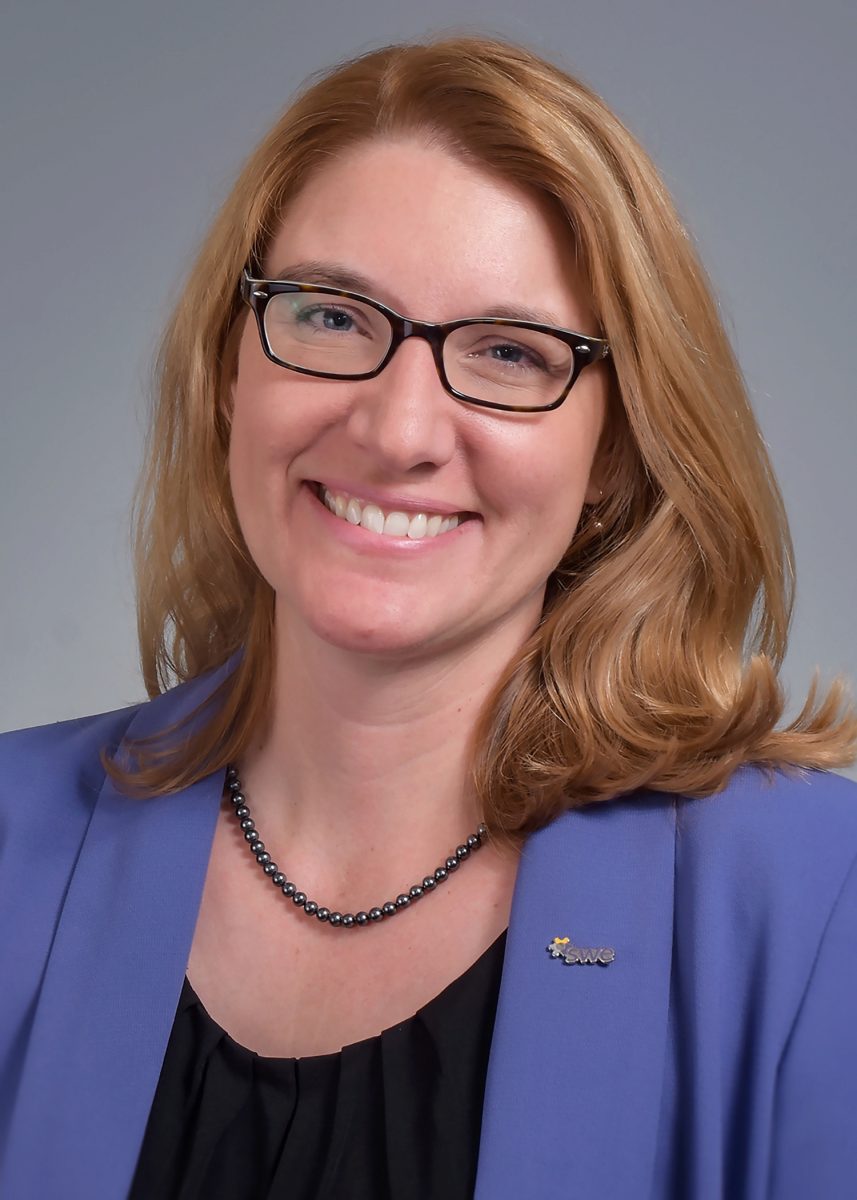 ChBE alumna Alexis McKittrick (PhD 2005), a research staff member in the Science and Technology Policy Institute at the Institute for Defense Analyses, recently won a Society of Women Engineers (SWE) Emerging Leader Award in recognition of her STEM achievements and community contributions.
ChBE alumna Alexis McKittrick (PhD 2005), a research staff member in the Science and Technology Policy Institute at the Institute for Defense Analyses, recently won a Society of Women Engineers (SWE) Emerging Leader Award in recognition of her STEM achievements and community contributions.
According to SWE, McKittrick is recognized “for demonstrating technical expertise and insight in shaping science policy; for consistent leadership and technical excellence across varied research environments and scientific topics; and for leadership in cultivating an inclusive environment.”
Throughout her career, McKittrick has had success at diving into new research areas and conducting analysis across disciplines in a wide range of research environments - from industry to the Environmental Protection Agency (EPA) and now the Science and Technology Policy Institute (STPI), one of three Federally Funded Research and Development Centers operated by the Institute for Defense Analyses (IDA).
Through the centers it operates, IDA seeks to answer the most challenging U.S. security and science policy questions with objective analyses leveraging exceptional scientific, technical, and analytic expertise. McKittrick's center, STPI, conducts non-partisan research and analysis across the science and technology spectrum to inform policy decisions of the White House Office of Science and Technology Policy in the Executive Office of the President.
Wide Array of Research
“I’m really proud of the range of research environments I’ve been able to thrive in,” McKittrick says. “My time at Tech taught me how to digest new information quickly and learn on the fly effectively as well as communicate science and technology to a wide range of audiences.”
At the nonprofit corporation IDA, which she joined in 2016, McKittrick has led and supported an extensive array of energy and environmental projects – as well as many others from her office at STPI across the street from the White House.
“It’s always an interesting opportunity to come into a room with a dozen different agencies that have different takes on a problem or that are working on different parts of the whole that then meld together into an interagency strategy,” McKittrick says. “I’m a big believer in having more scientists and engineers involved in policy to ensure that the most robust scientific information is being provided to policy makers.”
Juggling and Mentoring
McKittrick says she loves a challenge and takes on additional roles without concern that it will imbalance her life. “I’m not sure a perfect work/life balance exists,” says the mother of two. “Taking on lots of things you’re interested in is not always balanced, and it’s okay. Even a skilled juggler drops a ball now and again. And, if that happens, you try to drop a rubber ball rather than a glass ball. Not everything has to be perfect.”
She’s found that it’s important to both mentor and be mentored at all stages of her career. “I often learn as much from my mentees as they learn from me,” she says.
McKittrick encourages younger engineers to get actively involved with serving organizations with missions that resonate with them. “You can have a safe place to learn new leadership skills that you can then use in your career,” she says.
Serving Women Engineers
For the past 15 years, McKittrick has been highly involved in SWE, where she now serves as speaker of the senate on the organization’s board of directors. The SWE Senate, which McKittrick leads, is the strategic planning body of the society.
McKittrick says she was really proud to receive SWE’s Emerging Leader Award “because it focuses on a combination of technical leadership and service to the broader engineering community.”
She advises younger women engineers to ask questions unapologetically. “If you have questions, ask them, and those will generate more,” she says. “That’s how you develop the curiosity that will move you forward in your career."
McKittrick adds: “I’m a big advocate of investigating opportunities as they come up. It’s important for women engineers to raise their hand and say they’re interested in a new opportunity. That’s a way to ensure that whoever’s making the decisions knows that you are ready and willing to take new and hard challenges.”
Career Trajectory
After earning her PhD from Georgia Tech's School of Chemical and Biomolecular Engineering, McKittrick worked for Praxair (now merged with Linde), an international gases business, where she led a variety research projects and programs before moving into a government relations role.
Then she moved to a role as an environmental engineer for the EPA’s Climate Change Division, leading the Greenhouse Gas Reporting Program’s petroleum and natural gas and semiconductor industry efforts, among other duties.
“I hadn’t fully caught the “policy bug” until after I joined the EPA,” McKittrick says. “Now I’m hooked on using my career to ensure we use the best data and science to inform policy decisions.”
A native of Pasadena, Maryland, she earned her bachelor’s degree in chemical engineering from the University of Maryland, Baltimore County (UMBC) just prior to attending Georgia Tech for her graduate studies. While at UMBC, McKittrick was a Meyerhoff scholar.
Advised at Tech by Professor William Koros, McKittrick says she was attracted to the ChBE program by seeing the school’s professors working in a broad range of areas.
“There were lots of professors doing applied research, and I didn’t see that at other schools I was considering,” says McKittrick, who met her husband, Michael (ChBE PhD 2005, now in R&D for the U.S. Department of Energy), during their studies at Tech. “I wanted to see how my research could be used in the world, and I was able to do that at Tech.”